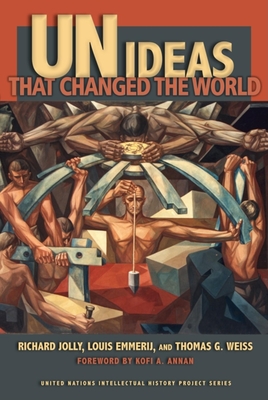
As part of a book launch, authors and co-directors of the UN Intellectual History Project, Louis Emmerij and Sir Richard Jolly discussed their book “UN Ideas that Changed the World”, summarising the UN’s influence, content of the UN’s economic ideas, and negative and positive impacts the UN has had on the world. As part of a 17 series project, this book is the final volume, ideally written as a summary of the other titles.
Sir Richard Jolly (Honorary Professor of the Institute of Development Studies) started the debate by asking, “Are we overstating the title of the book or marginalising the role of the UN?” Very rarely do analysts and academics look at the economic and social progress developed and implemented by the UN, and this is something the book highlights. Sir Jolly stated that “ideas are the big battalion of the UN” which is not an abstract concept that has no active steering power. Instead, UN ideas have been central to peace, human rights, social justice, rising living standards that acts as operational guidelines to leading action. At least 9 ideas have indeed changed the world for greater good. These include:
• Human Rights for all as highlighted by the UN Charter
• Gender equality and women’s rights implemented through CEDAW
• The Millennium Development Goals
• Fairer International and Economic Rights
• Strategy for accelerating the development of poorer countries
• Priorities for social development
• Environmental Sustainability
• Peace and Human Security
• Human Development
Louis Emmerij (Special Adviser to the President of the Inter-American Development Bank) looks at the UN slightly more critical however supported the claim of the UN changing the world. While there is less economic success in the UN, Mr. Emmerij shared a few examples to portray its impact. Without the implementation of an economic report written in 1950 by two Nobel Prize winners, the world would have handled employment, national development strategies and the international framework differently. The banks of today would not have survived with government help, while in the past leaning on government for subsidy was almost a taboo.
How can ideas gain global influence and traction? Sir Jolly stated that instead viewing the UN as ‘a dream managed by bureaucrats’, due to its hub of ideas, the UN has become ‘a bureaucracy managed by dreamers’, and that “working for the UN is like working for a government where all the political parties are in power at the same time”. Therefore there are bound to be pitfalls.
Ideas can change the perception of issues, as with the case of climate change, and redefine state and non-state. When goals and interests are similar, it is easy for ideas to gain momentum with the shared responsibility of implementing and monitoring the concept. Ideas cannot be successful without the backing of civil society, organisations, and civil servant interaction. There needs to be a shifting focus from state to individuals incorporating culture and common rights into development. There also needs to be a balance in supporting fragile states versus globalisation by strengthening global governance.
The UN leads the way with many fundamental ideas in humanitarian cases and economic brainstorming, ahead of the World Bank and International Monetary Fund, therefore the UN must not be overlooked as a “talking shop”, but an innovative hub that has secured safety and development in many fields.
www.UNhistory.org



















No comments:
Post a Comment